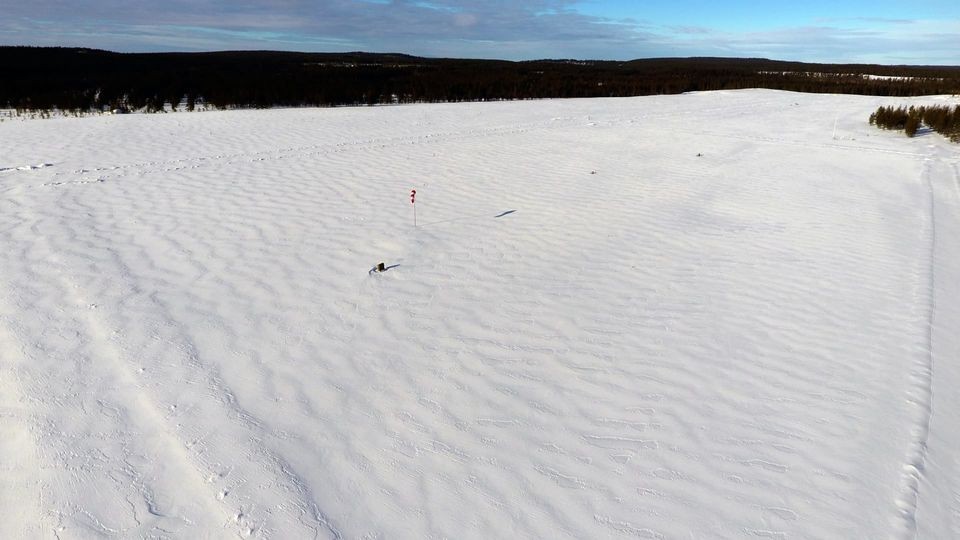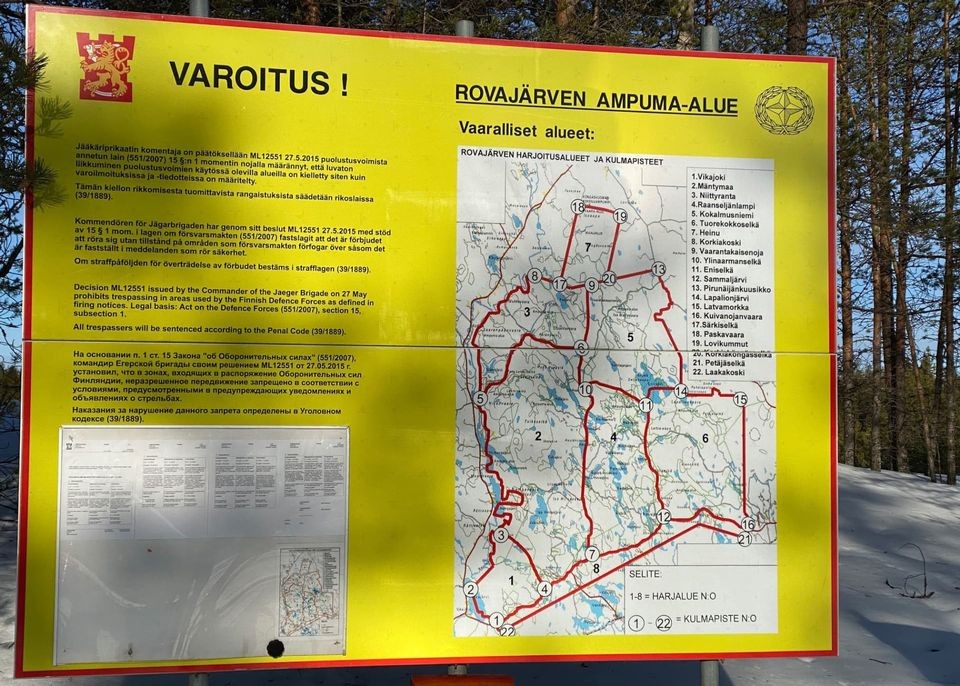Finland’s Defence Ministry blocked Chinese plans for research airbase in Lapland

A Chinese state research institute sought to lease or buy an airport adjacent to a military zone in 2018.
Yle understands that the state-funded Polar Research Institute of China made an offer to buy or lease the airport at Kemijärvi in Finnish Lapland for use as a base for flights over the Arctic region.
A purchase proposal was made to the City of Kemijärvi by a delegation of Chinese research institutes including a military expert in January 2018. The matter is only now being made public.
The delegation was led by Xia Zhang, Director of the Polar Research Institute of China, and Xu Shije, Director of the Chinese Arctic and Antarctic Administration. The party also included Major Lie Ji, an assistant to the military attaché at the Chinese Embassy in Finland.
The goal of the Chinese research institute was to establish an airbase for Arctic climate and environmental research flights extending to the northern polar area, according to Kemijärvi’s Mayor Atte Rantanen.
“Their intention was to conduct Arctic research on the polar ice cover, and they would have needed a base for these operations in Kemijärvi. A large jet aircraft with different measuring equipment would have come here, and they would have flown to the North Pole, taken their measurements and flown back,” Rantanen explains.
The flight route would have also made observations possible over the Arctic Ocean and the Northeast Passage, which is an area of interest to both China and Russia.
“The Northeast Passage is an important area and, of course, all of the big powers are interested in what kind of traffic is possible there,” Rantanen points out.

He adds that if the venture had gone ahead, the 1,400-meter runway for small aircraft at Kemijärvi Airport would have been extended to three kilometres in order to handle heavy jet traffic.
Renovation of the runway alone would have cost at least 40 million euros. In addition, new airport buildings and a research laboratory would have been required, all of which Rantanen says the Chinese research institutes would have been willing to finance.
Plan nipped in the bud
Kemijärvi Airport and its flight path is adjacent to the village of Ketola, and right next to the Finnish Defence Forces’ Rovajärvi firing range. The Defence Forces have also used the airport from time to time.
After receiving the Chinese proposal, the city inquired about the position of the Defence Forces on the idea.
“There was a clear view from the army that this type of activity cannot be carried out here. It’s too close to Rovajärvi,” says Rantanen, adding that there was no follow-up to the initial proposal.
Anu Sallinen, a consultant at the Ministry of Defence, told Yle that the ministry received information about the discussion on the purchase of Kemijärvi Airport three years ago. She says it is unlikely that the property would have been sold to any foreign state-owned entity as it is next to a strategically important firing range.
Sallinen furthermore noted that in addition to Finland’s own laws, an EU directive restricting foreign investment, which entered into force last October, would also have been an obstacle to such a deal.
Russia, and the Russian Kola Peninsula with its military bases, are also close to Kemijärvi. Finland’s eastern border is a distance of only a hundred kilometres. An airbase in Kemijärvi operated by Chinese research institutes would also have been of interest to Russia.
Russia’s proximity, as well as other neighbouring countries, had to be taken into account, Sallinen points out.

Global aspirations
Professor Matti Nojonen of the University of Lapland, who specialises in Chinese affairs, says he was aware of similar projects in other parts of the world, but not in Finland.
He sees the idea of setting up a research base in Kemijärvi as a reflection of China’s global aspirations.
“It was a bit surprising [to hear] that such a major great power political move had been made in Finland. Yes, we hear from the rest of the world that China has been trying to become more active, but I had no information about this before. It was surprising information in that sense,” Nojonen told Yle.
He adds that the research institutes that tried to acquire the Kemijärvi Airport are funded by the state and are also very close to the political leadership.
“The fact that the military attaché was also involved in this could even be said to be a clumsy move by China,” Nojonen says.
Kemijärvi Mayor Rantanen says he was not surprised by the presence of a Chinese military expert in the delegation.
“It is normal practice for them, as in Russia. There is always someone like that as an observer and consultant. It was nothing exceptional that respect,” Rantanen says.

Timo Koivurova, who is a research professor at the University of Lapland’s Arctic Centre, was also surprised by news of the Chinese proposal.
Koivurova has conducted research collaboration with the Polar Research Institute of China. Researcher exchanges and Arctic research conferences have been organised in Finland and China as well as in cooperation with other Nordic universities.
“The fact that there was a military representative present is not a very big surprise. After all, all the great powers have ways to slip people with military expertise into delegations if they so wish,” Koivurova says.
In Koivurova’s opinion, the presence of a military expert may have been related to the fact that the airport intended as a research base is so close to the Rovajärvi firing range.
Koivurova, says he was unaware of the Chinese Polar Research Institute’s interest in Kemijärvi Airport or any other site in Finland. He did note that China has invested heavily in Arctic and Antarctic research and has research bases in Greenland, Iceland and the Svalbard archipelago.
Related stories from around the North:
Canada: Canada stresses need for cooperation at Arctic Frontiers conference, Radio Canada International
Sweden: Wind power to be expanded to all of Sweden, Radio Sweden
China: China, Russia singled out in new U.S. Arctic defense strategy, Eye on the Arctic
Denmark: Pompeo to talk Arctic at upcoming meeting with Danish Foreign Minister, Eye on the Arctic
Iceland: Iceland welcomes “peaceful, low-tension cooperation” with China in Arctic, says foreign minister, Eye on the Arctic
Norway: Increase in NATO scrambled jets from Norway, The Independent Barents Observer
Russia: Threat of military conflict in the Arctic is ‘relatively low,’ says top Russian diplomat, Eye on the Arctic
Sweden: Sweden’s FM calls for more EU involvement in Arctic as country hosts EU Arctic Forum, Radio Sweden
United States: New U.S. Arctic strategy focuses on ‘day-to-day competition’ with Russia and China, Eye on the Arctic



